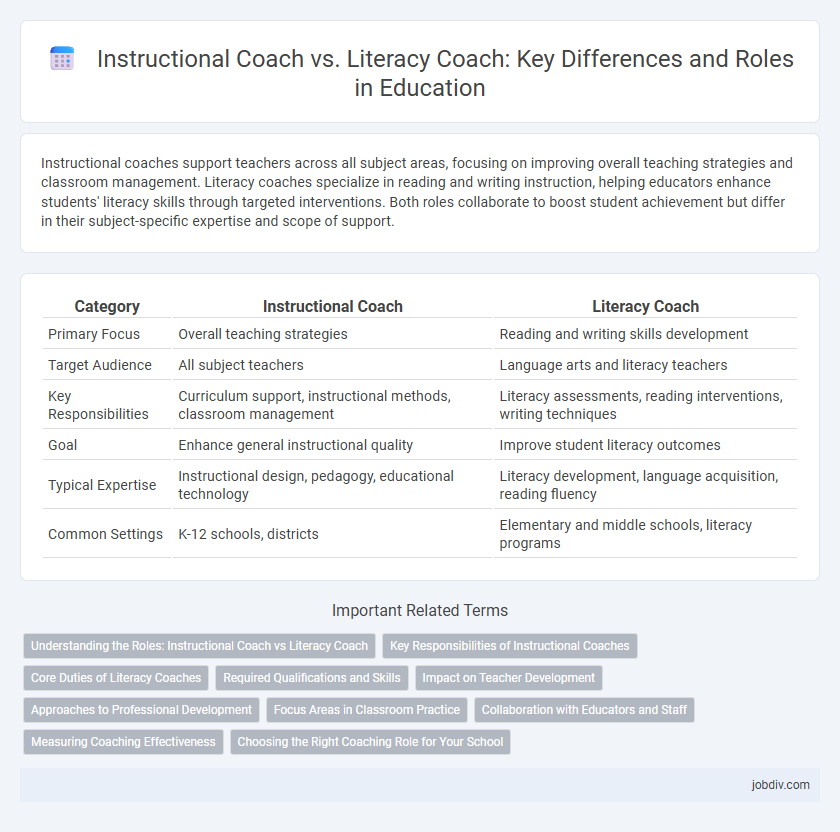Instructional coaches support teachers across all subject areas, focusing on improving overall teaching strategies and classroom management. Literacy coaches specialize in reading and writing instruction, helping educators enhance students' literacy skills through targeted interventions. Both roles collaborate to boost student achievement but differ in their subject-specific expertise and scope of support.
Table of Comparison
| Category | Instructional Coach | Literacy Coach |
|---|---|---|
| Primary Focus | Overall teaching strategies | Reading and writing skills development |
| Target Audience | All subject teachers | Language arts and literacy teachers |
| Key Responsibilities | Curriculum support, instructional methods, classroom management | Literacy assessments, reading interventions, writing techniques |
| Goal | Enhance general instructional quality | Improve student literacy outcomes |
| Typical Expertise | Instructional design, pedagogy, educational technology | Literacy development, language acquisition, reading fluency |
| Common Settings | K-12 schools, districts | Elementary and middle schools, literacy programs |
Understanding the Roles: Instructional Coach vs Literacy Coach
Instructional coaches support teachers across various subjects by providing strategies to improve overall instructional practices and student engagement. Literacy coaches specialize in enhancing reading and writing skills, focusing on literacy development, assessment, and interventions for students and educators. Both roles collaborate with teachers to implement effective teaching methods tailored to student needs, but literacy coaches have a targeted focus on language and literacy proficiency.
Key Responsibilities of Instructional Coaches
Instructional coaches specialize in supporting teachers through personalized professional development, curriculum implementation, and data-driven instructional strategies to enhance student achievement. They collaborate with educators to analyze classroom practices, provide targeted feedback, and facilitate reflective teaching techniques tailored to diverse learning needs. Unlike literacy coaches who focus primarily on reading and writing skills, instructional coaches address a broad range of subjects and instructional methodologies to improve overall teaching effectiveness.
Core Duties of Literacy Coaches
Literacy coaches primarily focus on improving reading and writing skills by providing targeted support to educators in implementing literacy programs, analyzing student data, and modeling effective instructional strategies. Their core duties include facilitating professional development centered on literacy best practices, collaborating with teachers to design lesson plans that address diverse student needs, and promoting literacy interventions that boost student achievement. Unlike broader instructional coaches, literacy coaches specialize in enhancing language arts proficiency to ensure students meet grade-level literacy standards.
Required Qualifications and Skills
Instructional Coaches typically require a valid teaching license, several years of classroom experience, and strong skills in curriculum design, assessment analysis, and effective communication. Literacy Coaches often need specialized certifications in literacy instruction, expertise in phonics and reading comprehension strategies, and the ability to support diverse learners across grade levels. Both roles demand collaborative skills, data-driven decision-making, and ongoing professional development to drive student achievement.
Impact on Teacher Development
Instructional coaches enhance teacher development by focusing broadly on instructional strategies across various subjects, improving overall teaching efficacy and student outcomes. Literacy coaches specialize in advancing literacy skills, providing targeted support in reading and writing that directly boosts teacher expertise in literacy instruction. Both coaching roles significantly influence professional growth, with instructional coaches offering comprehensive pedagogical guidance and literacy coaches delivering specialized content area improvements.
Approaches to Professional Development
Instructional coaches employ a broad, data-driven approach to professional development, focusing on enhancing overall teaching strategies, curriculum implementation, and student engagement across various subjects. Literacy coaches specialize in evidence-based reading and writing interventions, providing targeted support to improve literacy outcomes through modeling, feedback, and analysis of literacy assessments. Both roles utilize collaborative, job-embedded learning and ongoing formative assessment, but literacy coaching centers specifically on language arts proficiency and literacy instruction techniques.
Focus Areas in Classroom Practice
Instructional coaches primarily concentrate on enhancing overall teaching strategies, classroom management, and curriculum implementation to improve student learning outcomes across subjects. Literacy coaches specialize in reading and writing skills, supporting teachers with evidence-based literacy instruction, assessment, and interventions tailored to diverse learner needs. Both roles collaborate with educators to analyze classroom data and refine instructional practices, but literacy coaches specifically target language arts proficiency and literacy development.
Collaboration with Educators and Staff
Instructional coaches collaborate with educators by analyzing classroom practices and providing tailored strategies to enhance overall teaching effectiveness, focusing on curriculum alignment and student outcomes. Literacy coaches specialize in partnering with teachers to improve reading and writing instruction through data-driven techniques and targeted professional development. Both roles emphasize continuous dialogue and teamwork to foster a supportive learning environment and promote instructional growth.
Measuring Coaching Effectiveness
Measuring coaching effectiveness in education involves analyzing key performance indicators such as student achievement growth, teacher implementation fidelity, and engagement levels. Instructional coaches focus on diverse content areas and pedagogical strategies, requiring broader evaluation metrics including lesson observation scores and teacher feedback. Literacy coaches concentrate on reading and writing proficiency, making literacy-specific assessments like fluency rates and comprehension progress crucial for effectiveness measurement.
Choosing the Right Coaching Role for Your School
Instructional coaches support teachers across all subject areas by focusing on pedagogy, classroom management, and data-driven strategies to improve overall instructional quality. Literacy coaches specialize in reading and writing skills development, targeting literacy achievement through evidence-based interventions aligned with state standards. Schools should assess their primary instructional challenges and student achievement goals to determine whether a broad instructional approach or a focused literacy improvement is most critical.
Instructional Coach vs Literacy Coach Infographic

 jobdiv.com
jobdiv.com